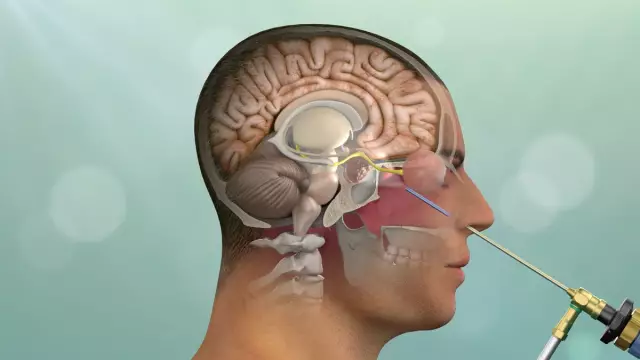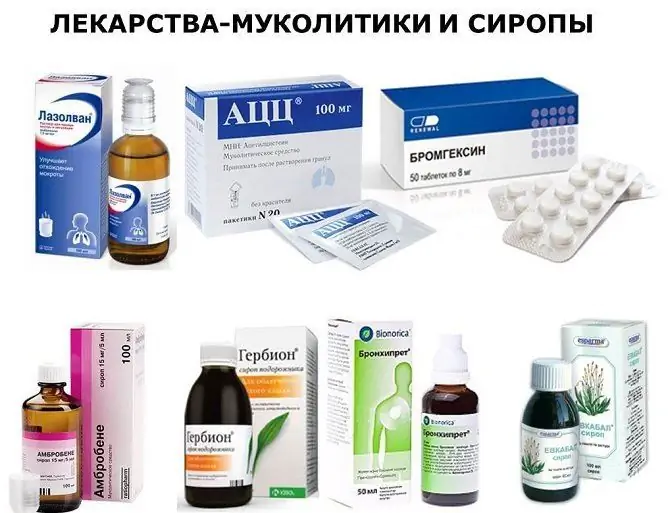- Author Rachel Wainwright wainwright@abchealthonline.com.
- Public 2023-12-15 07:39.
- Last modified 2025-11-02 20:14.
Medicines for sinusitis: effective drugs for treating the disease
The content of the article:
-
Preparations for the treatment of sinusitis
- Antibiotics
- Local drugs with a vasoconstrictor effect
- Solutions for rinsing the nose
- Mucolytics
- Corticosteroids
- Antihistamines
- Non-steroidal anti-inflammatory drugs
- Herbal preparations
- Video
Sinusitis is a disease in which the inflammatory process is localized in the area of the maxillary sinuses. It affects one or both maxillary cavities. The cause of the development of the disease is most often viral or bacterial infections, allergies, chronic otitis media or dental diseases.

To prescribe adequate therapy, you must consult an otolaryngologist
Symptoms of the disease appear depending on its form. With acute sinusitis, the patient's body temperature rises, headaches appear, which intensify when bending over or in the evening. Also, as a result of inflammation of the mucous membrane of the maxillary sinuses, nasal congestion and purulent discharge occur.
In the chronic form of the disease, the symptoms are not so pronounced. The patient has a chronic runny nose and nasal congestion, dull facial pain and cough. How to treat sinusitis in adults, medicines or alternative methods?
Preparations for the treatment of sinusitis
It must be remembered that sinusitis is a serious disease, and with inadequate and untimely treatment, it can easily become chronic or cause the development of meningitis, phlegmon, otitis media and other serious diseases.
How is sinusitis treated? If you suspect the development of the disease, you should contact an otolaryngologist and pass all the necessary tests. The doctor prescribes medications, determines their dosage and duration of use. Self-treatment can worsen the condition and lead to complications.
Antibiotics
Drugs in this group are most often prescribed for the treatment of acute sinusitis. In order to choose the right remedy, it is necessary to determine the causative agent of the disease. But in most cases, the funds of this group are prescribed based on the indications (the presence of purulent discharge, an increase in body temperature).

Along with other antibiotics, penicillins are used in the treatment of sinusitis.
Initially, the strongest drug is chosen, which is hypothetically capable of coping with the disease. The drug of choice is drugs with a wide spectrum of action that actively affect most pathogenic bacteria that could lead to the development of the disease.
Antibiotics of the following groups are used against sinusitis:
- Penicillins (Amoxiclav, Augmentin, Flemoxin, Amoxil).
- Macrolides (Azithromycin, Sumamed, Josamycin).
- Cephalosporins (Ceftriaxone, Emsef, Cefazolin).
- Fluoroquinolones (Ofloxacin, Norfloxacin, Ciprofloxacin).
In severe forms of sinusitis, antibiotics are prescribed in the form of solutions for intramuscular or intravenous administration. If the disease is not so severe, tablets, capsules or syrups are used. Also, antibiotics in the form of inhalation can be used for treatment.
The duration of therapy depends on the course of the disease. The acute form is treated for 5-7 days, the chronic - up to two weeks.
The use of antibiotics can cause the development of side effects such as indigestion, nausea, vomiting, headache. But, despite this, antibiotics are really the best remedy for bacterial sinusitis.
In order to minimize the negative effect of these drugs on the body, in combination with them, drugs are prescribed to restore normal intestinal microflora: Linex, Laktovit, Laktiale. Also, antifungal agents are often used in the complex treatment of sinusitis.
Local drugs with a vasoconstrictor effect
Vasoconstrictor drugs for sinusitis can reduce swelling of the nasal mucosa and facilitate the release of purulent contents from the maxillary sinuses. The drugs are most often used to treat sinusitis at home.

In the treatment, local vasoconstrictor agents with different duration of action can be used.
During therapy, agents are used containing the following active substances:
- Oxymetazoline (Nazivin, Nazol, Knoxprey). Their action begins to develop 10-15 minutes after administration and lasts up to 12 hours.
- Xylometazoline (Galazolin, Evkazolin). The funds begin to act 5 minutes after administration, the duration of the effect is up to 6 hours.
- Naphazoline (Naphtizin, Sanorin). The effect of drugs in this group begins to appear 10-20 minutes after application.
Before the introduction of vasoconstrictor drugs, it is necessary to rinse the nose. Antibiotic drops are used after the previous medicine has begun to work, in which case the effect of its use is enhanced.
Solutions for rinsing the nose
For the treatment of sinusitis are used:
- hypertonic saline solutions;
- isotonic saline solutions;
- antiseptics.
A procedure such as rinsing the nasal cavity allows you to moisturize the nasal mucosa and reduce its swelling, and helps to remove clots of purulent secretions.

Sinusitis therapy includes rinsing the nose with hypertonic and isotonic saline solutions
In therapy, both home-prepared solutions and pharmaceuticals can be used, most often based on sea salt. Trace elements that are part of seawater stimulate reparative processes, have an anti-inflammatory effect, improve the function of the ciliated epithelium, which leads to increased resistance of the nasal mucosa to the introduction of pathogenic viruses and bacteria, and also contributes to its purification.
The most effective preparations based on sea water: Morenazal, Marimer, Aqua Maris, Physiomer, Fluimarin, Sialor Aqua.
Mucolytics
Prolonged inflammation in the maxillary sinuses can lead to an increase in the viscosity of the nasal secretion. The mucus becomes very thick, and a cough appears against this background. Sometimes bronchitis is diagnosed.
In these cases, the use of mucolytics is effective, since they help to liquefy thick pus and mucus. The most commonly used drugs are based on acetylcysteine (ACC, Mukonex, Fluimucil, Mukomist, Acetylcysteine) or carbocisteine (Bronchobos, Mukodin, Carbocisteine, Bronkatar, Mukosol, Fluditek). Such drugs for sinusitis can reduce the viscosity of the secretion and speed up its excretion.
Corticosteroids
Drugs that belong to the group of corticosteroids can significantly alleviate the condition of patients with chronic sinusitis. Their purpose makes sense if there is pronounced swelling of the nasal mucosa or the effect of the use of other drugs is absent.
The most commonly used preparations contain the following active substances:
- mometasone furoate: Nasonex, Nosephrine. These are the most popular drugs that have anti-inflammatory, anti-allergic effects and well relieve swelling of the nasal mucosa. Unlike other drugs, mometasone furoate is practically not absorbed through the mucous membranes and skin. It has no systemic action;
- beclomethasone: Beconase, Nasobek. They also have anti-inflammatory effects and are effective for swelling of the nasal mucosa;
- fluticasone: Flixonase, Nazarel, Fluticasone propionate. The products eliminate swelling, helping to reduce the amount of nasal discharge. Absorbed in minimal amounts, practically without systemic effects on the body.
Most often, medicines from the group of corticosteroids are prescribed in the complex treatment of chronic sinusitis. If the cause of the development of the disease is an acute bacterial infection, the use of such drugs is not justified.
Antihistamines
Drugs in this group can reduce edema, thereby facilitating the outflow of contents from the maxillary sinuses and the restoration of nasal breathing.
In the complex treatment of the disease, drugs of the first or second generation are used:
- 1st generation: Diphenhydramine, Suprastin, Tavegil. They must be used 2-3 times a day, and they often lead to the development of drowsiness.
- Generation II: Loratadin, Cetirizin, Fenistil. You need to take the drugs once a day, they work quickly and, unlike the 1st generation antihistamines, do not cause drowsiness.
Non-steroidal anti-inflammatory drugs
Drugs from the group of NSAIDs (non-steroidal anti-inflammatory drugs) for sinusitis are prescribed to eliminate pain, reduce the inflammatory process and lower body temperature.
Most often, in the complex treatment of sinusitis, drugs based on paracetamol or ibuprofen are used. They are well tolerated and have minimal side effects.
Most often, NSAIDs are taken 2-3 times a day. The course of treatment should not exceed 5 days. Sometimes your doctor may recommend taking these medications as needed if you need to lower your body temperature or relieve pain.
Herbal preparations
Medicines for sinusitis based on herbal raw materials are most popular in home therapy. The biologically active substances that make up these drugs affect the symptoms of the disease and reduce inflammation. They can be purchased at pharmacies.

One of the most effective drugs, Sinuforte, contains cyclamen roots
The most effective herbal remedies for sinusitis are:
- Sinupret. Green pills that help with inflammation of the maxillary cavities are well-deservedly popular. They include primrose, elderberry, sorrel and verbena. The drug has mucolytic, anti-inflammatory and immunomodulatory properties. It relieves swelling well and improves the outflow of the contents of their maxillary sinuses. Sinupret is prescribed for children in the form of drops or syrups.
- Sinuforte. These are cyclamen-based nasal drops. The active ingredient of the drug affects the receptors of the trigeminal nerve. In 30-60 minutes after administration, a reflex increase in secretion occurs. The amount and volume of exudate increases, and its transportation improves, due to this, the sinuses are quickly cleared of the contents, as a result, the inflammation decreases, and the symptoms of the disease disappear.
- Cinnabsin. This homeopathic remedy based on herbal ingredients allows you to remove edema, restore nasal breathing and reduce the viscosity of the secretion. The drug is absolutely safe, so it can be used to treat sinusitis in children.
Treatment of sinusitis with drugs must be carried out under the supervision of an otolaryngologist. With correct and timely therapy, improvement is observed already on the third day: the symptoms of the disease gradually disappear, headaches stop, and nasal breathing is restored. But if this did not happen, the treatment tactics should be changed.
If necessary, in agreement with the ENT, some drugs can be replaced with inexpensive analogues.
Video
We offer for viewing a video on the topic of the article.

Anna Kozlova Medical journalist About the author
Education: Rostov State Medical University, specialty "General Medicine".
Found a mistake in the text? Select it and press Ctrl + Enter.






